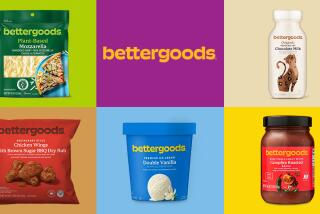2 Chains Ban Engineered Foods
- Share via
Underscoring the growing backlash against agricultural biotechnology in the U.S., the nation’s two largest natural food supermarket chains said Thursday that they will ban genetically modified ingredients from their hundreds of private-label products.
Austin, Texas-based Whole Foods Market Inc., which operates 103 stores in 22 states, and 110-store Wild Oats Markets Inc. of Boulder, Colo., are the first major supermarket chains in the nation to ban genetically modified ingredients, following similar bans by European supermarket chains concerned about food safety. Whole Foods operates 16 stores in Southern California, and Wild Oats has eight.
“The truth is we don’t know what the effects of GMOs are, and we think consumers should have the right to choose,” says John Mackey, chief executive of Whole Foods. About 12% of Whole Foods’ $1.6 billion in sales in the fiscal year ended September 1999 were derived from sales of its more than 600 private-label products.
Wild Oats derives about 10% of its revenue from almost 1,000 of its branded products, says President Jim Lee.
The move, which follows a ban by several major baby-food manufacturers and calls by members of Congress for special labeling, could further intensify public outcry about genetically modified organisms, or GMOs, which experts estimate are in about 60% of all grocery products through genetically engineered corn or soybeans.
However, supermarket industry officials and food manufacturing associations say most mainstream supermarket chains are unlikely to adopt similar restrictions because they don’t consider GMOs a health risk and because it would prove too expensive.
“The majority of foods do have some biotech ingredients in them,” said Lisa McCue, spokeswoman for the Grocery Manufacturers Assn. of America. “It would be very difficult for most mainstream supermarkets to go totally non-biotech.”
Indeed, analysts say, it’s much easier for natural foods chains to ban genetically modified ingredients because many of their products are organic and these foods by definition cannot contain genetically altered ingredients.
Indeed, some analysts said these chains are exploiting consumer fears to sell more of these more profitable products. But officials from both chains say they are responding to customer demand.
“We are receiving tons of letters and e-mail,” Mackey says. “A lot of our customers don’t want GMOs in their food.”
The Food and Drug Administration has said it considers genetically engineered foods safe, carrying no greater risk than food grown from conventional seed. However, public concern about the potential long-term health risks has prompted the agency to solicit public comment on its policies. The FDA currently allows genetically altered material in food, as long as it doesn’t contain allergens or substantially alter the nutritional content of the food.
“If there was any scientific evidence that GMOs were unsafe, then Kroger would cease selling [products containing] them,” says Gary Rhodes, a spokesman for Kroger Co., parent of Ralphs. Officials with Safeway Inc., parent of Vons, were not available for comment.
Margaret Wittenberg, vice president of governmental and public affairs for Whole Foods, says most of its private-label products already are free of genetically modified ingredients. It is now trying to line up new supply contracts for the remaining products and will lab test the ingredients and products to ensure they are GMO-free.
Likewise, Wild Oats President Jim Lee says his chain will begin introducing GMO-free products beginning next year, using an outside lab to test for genetically modified ingredients.
More to Read
Inside the business of entertainment
The Wide Shot brings you news, analysis and insights on everything from streaming wars to production — and what it all means for the future.
You may occasionally receive promotional content from the Los Angeles Times.










